
Part II: Diplomacy with Chinese Characteristics: PRC Consulate Gray Zone ‘Pop-up’ Events in New York
Publication: China Brief Volume: 24 Issue: 20
By:
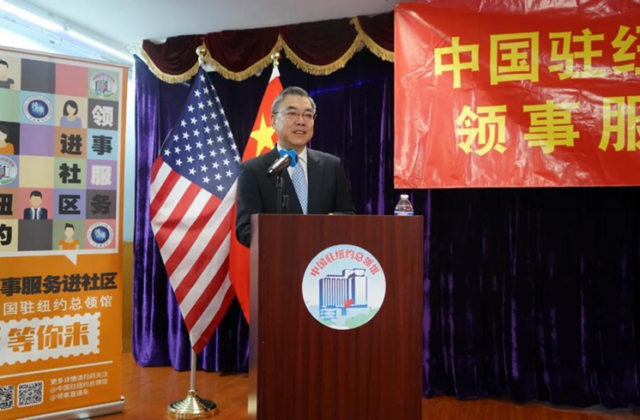
Executive Summary:
- “Pop-up” events by People’s Republic of China (PRC) consular officials across the United States are accompanied by online propaganda campaigns on social media, as part of a gray zone approach to cognitive warfare.
- The events, which may contravene international and US law, are framed as “convenient” for Chinese diasporic communities, while the officials themselves are valorized as “caring” representatives of the motherland.
- PRC consulates, state media, and diasporic organizations use social media platforms like WeChat, Facebook, and YouTube in coordinated ways to amplify propaganda.
Editor’s note: This article is the second in a two-part series. The first part detailed gray zone “pop-up” events hosted by the PRC’s consulates general across the United States in community settings, and collaboration between the consulates general and organizations connected to the united front system. Part I can be read here. You can also read a combined version of the article at the PDF at the bottom of this page, or at the link here.
The activities of consular officials from the People’s Republic of China (PRC) in the United States and other countries appear to extend beyond the standard provision of consular services. This implies not only the breaking of diplomatic norms, but also the violation of international—as well as US domestic—law. The US government has announced that it is aware of PRC activities that are seeking to influence congressional races and candidates in the country’s November elections (US Department of State, October 7). It has not stated whether it is aware of the penetration of Chinese Communist Party (CCP) officials directly into local communities via consular “pop-up” events. These events, held at non-designated diplomatic facilities, are often co-hosted with organizations connected to the CCP’s united front system. Some of these organizations appear to have been involved in influencing previous election races (US China Press, July 31, 2023; China Brief, October 4).
Much of the activity surrounding these consular events occurs in the digital domain. Increased activity is found before and after pop-up events, usually coordinated across Chinese and Western social media platforms and between official accounts and those of state-affiliated media. Online content serves two purposes. One is informational, to broadcast general information about the events themselves for potential attendees and to document their execution. The other is to propagandize on behalf of the Party-state. Two narrative frames recur throughout the content posted about the pop-up events: The characterization of the consular officials—and, by extension, the CCP—as benevolent and willing to go above and beyond for its citizens, and of those citizens as grateful, in turn, to the “motherland” for taking care of their needs.
WeChat Posts Depict Consular Events as ‘Caring’ and ‘Convenient’
Consular service activities organized by the PRC’s consulates general in the United States often coincide with broader propaganda work, both on-site at the events and through social media campaigns from the consulates themselves. The PRC consulate general in New York, for instance, publishes regularly on its WeChat account both before and after the events that it runs. For instance, in March 2024, at the first consular service event of the year, Consul General Huang Ping (黄屏) delivered a speech highlighting the consulate’s efforts in organizing the event series. He stated that the events exemplify Beijing’s commitment to “serving the people” and that he and the New York consulate will always strive to enhance the “sense of accomplishment and happiness” of overseas Chinese people (WeChat/PRC Consulate General in New York, March 12). Rhetoric of this nature has long been used by PRC diplomats overseas. New York’s previous consul general, Zhang Qiyue (章启月), also made a speech elaborating on the CCP’s 19th National Congress in October 2017—stressing the consulate’s commitment to people-centered diplomacy and to improving consular services for overseas Chinese people (WeChat/PRC Ministry of Foreign Affairs, November 10, 2017). Through direct engagement from consuls general, pop-up consular service events are intended to project a positive image of the PRC and convince Chinese Americans that they are closer to Beijing than Washington.
Chinese social media platforms such as WeChat and Weibo disseminate information that supports, and at times enhances, the rhetoric of the consuls general, using language that frames the PRC as providing “caring” services that seek to be “convenient” for their target audience. Such messaging aims to increase the sense of belonging among overseas Chinese and to instill in them a sense of patriotism, or even nationalism. Xi Jinping has repeatedly emphasized that united front work focuses on uniting all who can be united by strengthening common ideologies, with the goal of developing the “broadest patriotic united front to accomplish the China dream (最广泛的爱国统一战线为实现中国梦)” (People’s Daily, May 20, 2015). [1] Through their outreach into local diasporic communities, the PRC consulates general conduct political work, promoting Xi Jinping’s language about “national rejuvenation” to influence perceptions of the PRC and strengthening their presence within the Chinese diasporic communities in America.
Figure 1: Screenshot of the WeChat article published by the Chinese Consulate General in San Francisco, titled “Consulate General in San Francisco hosts ‘Bringing Consular Services to the Community’ Event in Seattle”
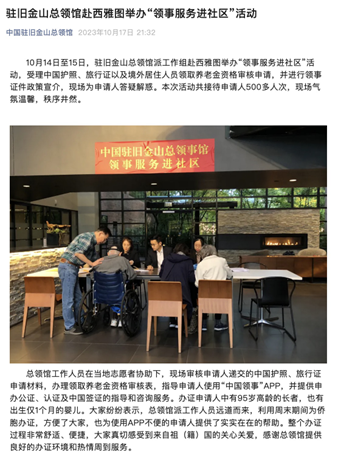
An article published by the official WeChat account of the PRC consulate general in San Francisco used glowing terms to portray a trip to Seattle to host a “Bringing Consular Services into the Community (领事服务进社区)” event over a weekend in October, 2023 (WeChat/PRC Consulate General in San Francisco, October 17, 2023). [2] After detailing the consular services provided, the article valorized the consular officials and depicted the attending local Chinese community, who ranged from 95-year-old pensioners to one-month-old babies, as full of admiration for their work. It claimed the Chinese community was “grateful (感谢)” for the consulate’s efforts to “send staff from afar and use their weekend to provide consular service (派工作人员远道而来,利用周末期间为侨胞办证),” while emphasizing how “convenient (便捷)” the consulate staff made the process and how “warm and considerate (热情周到)” they were. The article finished by describing how the residents sincerely felt the “love and care (关心关爱)” of their “motherland (country of citizenship) (祖(籍)国).”
Online Networks Coordinate to Amplify Propaganda
Articles such as those highlighted above are effectively propaganda pieces about consular pop-up events. Not only are they frequently posted by the PRC consulates’ WeChat accounts, but they are also cross-posted to other social media platforms, including Western platforms such as Facebook and YouTube, which are popular among some diasporic communities. Entities involved in amplifying these influence operations range from Chinese state media’s official accounts and gray media to organizations with alleged ties to PRC state entities.
The Pittsburgh Chinese Cultural Center, for instance, shared the details of an upcoming consular service event on Facebook, X (formerly Twitter), and Linkedln on April 9, 2024 (Facebook.com/pghccc, X.com/Pghccc; linkedin.com/pgh-chinese-cultural-center, April 9). The close time intervals between this post and the official launch post by the consulate general suggest potential coordination between the two organizations (PRC Consulate General in New York, April 9). This possibility is made more likely by the fact that the chairman of the Pittsburgh Chinese Cultural Center, Dave Jiao (焦德泉), appears to have a close relationship with the New York consulate. During the COVID-19 pandemic, Mr. Jiao’s contact details were shared by the consulate for “assisting overseas Chinese students” (Pittsburgh Chinese Cultural Center, accessed September 14; WeChat/PRC Consulate General in New York, April 1, 2020).
Coordination of this kind is made even more likely when considering the broader pattern of cross-posting—a common tactic in online influence operations that seeks maximum exposure of specific content to a target audience. In these cases, content published by the consulates’ official channels is cross-posted to other platforms, including Western ones such as Facebook and YouTube. Cross-posted content is not confined to the consulates’ official accounts: it also occurs via other entities. One such example is the social media presence of China DragonTV (东方卫视), an entity under the direct control of the state-owned Shanghai Media Group (上海广播电视台) (SMG, accessed July 19).
On December 12, 2023, China DragonTV published a video titled “The Chinese Consulate General in New York’s ‘Bringing Consular Services to the Community’ event has provided services to over 2,000 overseas Chinese this year, and the expatriates have praised it warmly!” on both its Douyin account and its YouTube channel (Douyin/China DragonTV; YouTube/China DragonTV, December 12, 2023). The video highlights an event held the previous week in Ohio and includes an interview with New York Consul General Huang Ping claiming that this form of people-centered diplomacy is very welcome, making the Chinese community “truly feel” that “the motherland is right behind them and the consulate general is right beside them (祖国在你身后,总领馆在你身边).” Soundbites from visitors featured in the clip praise the convenience of the consular service, making them feel like “every Chinese person is being treated as a family member (把每个人 (侨胞) 都当成自己家人).” These edited interviews are presented as vox pops that are representative of the diasporic community more broadly, helping to advance the narrative that overseas Chinese people are grateful to their benevolent motherland.
Figure 2: LinkedIn (top) and Facebook (bottom) Posts by the Pittsburgh Chinese Cultural Center
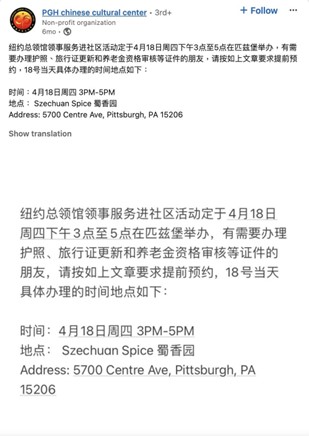
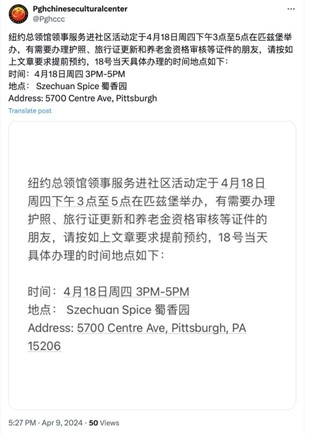
PRC state media outlets also move beyond simple cross-posting to provide supplemental coverage of the consular events, representing an additional avenue for advancing PRC narratives in the United States. US China Press (侨报网) is one such outlet. Founded by personnel from PRC state media China News Service and the Overseas Chinese Office of the State Council in the early 1990s, it was originally conceived as an effort to crack down on negative public opinion on Beijing after the Tiananmen Square massacre. [3] It is currently managed by The China Press/Qiaobao (侨报), a news outlet controlled by the United Front Word Department through PRC state media China News Service. [4] This affiliation is omitted on its social media profiles, however. On TikTok, for instance, the US China Press describes itself as founded by 11 Chinese Americans who immigrated from Mainland China, Taiwan, and Hong Kong (US China Press, accessed September 19). The outlet has written extensively on the pop-up events, publishing 26 articles between January 2019 and July 2024 highlighting these gray zone activities. The articles actively promote the consular services by emphasizing the “friendly interaction (亲切交流)” between consular officers and participants, the “warm atmosphere (温暖的气氛)” of the events, and the positive feedback received from the Chinese diasporic communities (US China Press; March 27, July 15). This messaging echoes the descriptions seen in the consulates’ official characterizations of the pop-up events, further suggesting a degree of coordination.
In addition, the consulates’ apparent ability to coordinate between purportedly independent organizations and media outlets to amplify specific information and propaganda narratives is an alarming sign of the PRC’s growing efforts to interfere in—and gain more control over—Chinese diasporic communities through their digital information environment.
Figure 3: Screenshot of a video published by China Dragon TV on its YouTube Channel (top) and Douyin account (bottom)
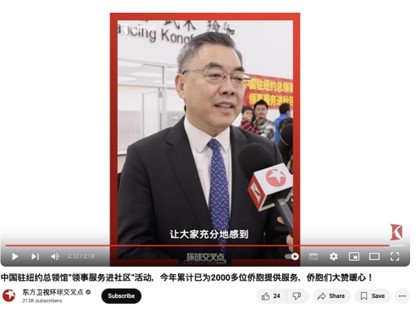
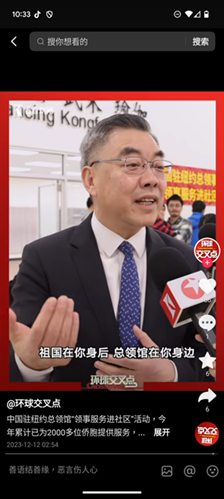
Politicization of ‘Pop-ups’ as Peacetime Cognitive Domain Operations
Posts on social media platforms about the events generally have low viewership and engagement rates, though this does not necessarily equate to impact. While these operations appear to primarily target overseas Chinese people and hence may have limited reach among non-Chinese language speakers, their implications on threatening national security and liberal democracy are far more profound beneath the surface.
Constant messaging of this kind represents one tactic among a broader ideological campaign that intrudes not only on foreign territories but also on diasporic communities’ cognitive sovereignty. Consistently framing the PRC as a benevolent state that is looking out for its compatriots overseas is a tactic within the PRC’s approach to peacetime cognitive warfare (China Brief, September 6, 2019). While nominally used to provide consular services to local communities in the United States, the PRC intentionally politicizes these bureaucratic processes through calculated moves to shape diasporic perceptions. This approach operates in the gray zone, allowing nominally bureaucratic activities to serve as a medium for influence operations that reinforce the CCP’s preferred narrative about the PRC. Part of the goal of this ideological push is to inculcate a sense of loyalty to the nation, with the implicit assumption that the state’s benevolence will one day need to be repaid through political mobilization.
As such, consular pop-up events should be viewed as part of the PRC’s wider use of hybrid tactics that erode the legal norms and institutions established by its adversaries. The regular operationalization of the initiative, in fact, represents an intensification of the PRC’s preexisting extraterritorial law enforcement efforts. Without effective countermeasures, this is likely to continue and expand.
Conclusion
The PRC’s “Bringing Consular Service into Community” pop-up events are likely a worldwide operation. Similar events appear to have been conducted by local PRC consulates under the same initiative in Canada, the United Kingdom, Hungary, Tanzania, Jamaica, and elsewhere. None of these seem to be on the same scale as in the United States, however. While consulates’ gray zone activities in different countries may differ, they all carry similar implications.
These gray zone operations set a precedent for the PRC’s growing, pervasive efforts to extend its outreach and exert control over its diaspora in external jurisdictions. Reinforced by Beijing’s influence operations on social media, the pop-ups serve as a basis for broader ideological campaigns. The aim, as articulated by Xi Jinping, is not only to influence public perceptions of the PRC but also to generate a “patriotic united front” for his dream of “national rejuvenation.”
Through these pop-up events, PRC diplomats are leveraging an asymmetric advantage, exploiting open societies and vulnerabilities inherent in liberal democratic systems. Such tactics lie at the heart of the PRC’s hybrid warfare strategy. Beijing’s gray zone operations challenge existing international norms and rules-based order, yet under the threshold of a major diplomatic scandal. These “pop-up” events, therefore, constitute a far more problematic issue than their nominal function of providing innocuous “consular services.”
Notes
[1] On the “China dream,” see China Brief, March 28, 2013; April 25, 2013.
[2] In addition to the PRC consulate in New York, the PRC consulates general in San Francisco, Chicago, and Houston all appear to organize similar events under the same “Bringing Consular Services into the Community” initiative. The time frame for these events ranges from 2017 to 2024.
[3] Diamond, Larry and Schell, Orville. (2019). “China’s Influence & American Interests: Promoting Constructive Vigilance.” The Hoover Institution Press. Available at: https://www.hoover.org/research/chinas-influence-american-interests-promoting-constructive-vigilance
[4] Joske, Alex. (2020). “The party speaks for you: Foreign interference and the Chinese Communist Party’s united front system.” Australian Strategic Policy Institute. Available at: https://www.aspi.org.au/report/party-speaks-you.




